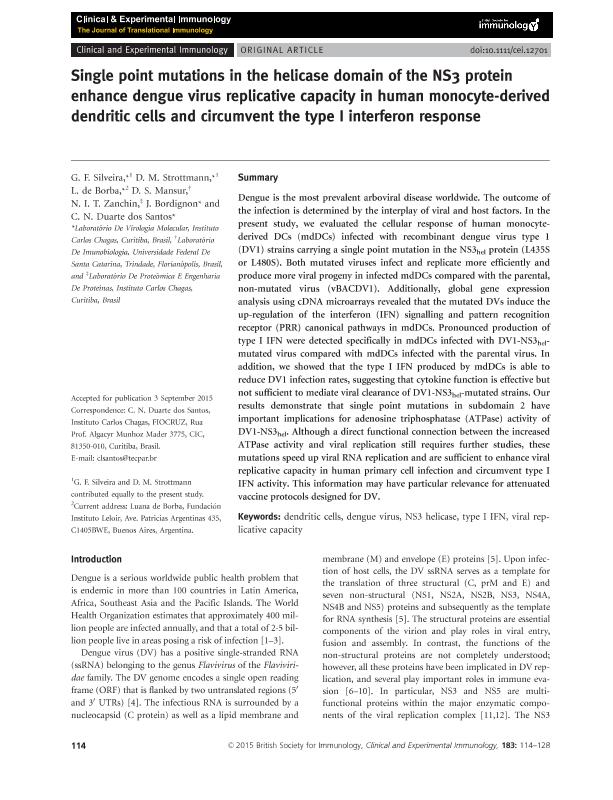Artículo
Single point mutations in the helicase domain of the NS3 protein enhance dengue virus replicative capacity in human monocyte-derived dendritic cells and circumvent the type I interferon response
Silveira, G. F.; Strottmann, D. M.; de Borba, Luana ; Mansur, D. S.; Zanchin, N. I. T.; Bordignon, J.; Duarte dos Santos, C.N.
; Mansur, D. S.; Zanchin, N. I. T.; Bordignon, J.; Duarte dos Santos, C.N.
 ; Mansur, D. S.; Zanchin, N. I. T.; Bordignon, J.; Duarte dos Santos, C.N.
; Mansur, D. S.; Zanchin, N. I. T.; Bordignon, J.; Duarte dos Santos, C.N.
Fecha de publicación:
10/2015
Editorial:
Wiley Blackwell Publishing, Inc
Revista:
Clinical and Experimental Immunology
ISSN:
0009-9104
e-ISSN:
1365-2249
Idioma:
Inglés
Tipo de recurso:
Artículo publicado
Clasificación temática:
Resumen
Dengue is the most prevalent arboviral disease worldwide. The outcome of the infection is determined by the interplay of viral and host factors. In the present study, we evaluated the cellular response of human monocyte-derived DCs (mdDCs) infected with recombinant dengue virus type 1 (DV1) strains carrying a single point mutation in the NS3hel protein (L435S or L480S). Both mutated viruses infect and replicate more efficiently and produce more viral progeny in infected mdDCs compared with the parental, non-mutated virus (vBACDV1). Additionally, global gene expression analysis using cDNA microarrays revealed that the mutated DVs induce the up-regulation of the interferon (IFN) signalling and pattern recognition receptor (PRR) canonical pathways in mdDCs. Pronounced production of type I IFN were detected specifically in mdDCs infected with DV1-NS3hel-mutated virus compared with mdDCs infected with the parental virus. In addition, we showed that the type I IFN produced by mdDCs is able to reduce DV1 infection rates, suggesting that cytokine function is effective but not sufficient to mediate viral clearance of DV1-NS3hel-mutated strains. Our results demonstrate that single point mutations in subdomain 2 have important implications for adenosine triphosphatase (ATPase) activity of DV1-NS3hel. Although a direct functional connection between the increased ATPase activity and viral replication still requires further studies, these mutations speed up viral RNA replication and are sufficient to enhance viral replicative capacity in human primary cell infection and circumvent type I IFN activity. This information may have particular relevance for attenuated vaccine protocols designed for DV.
Archivos asociados
Licencia
Identificadores
Colecciones
Articulos(IIBBA)
Articulos de INST.DE INVEST.BIOQUIMICAS DE BS.AS(I)
Articulos de INST.DE INVEST.BIOQUIMICAS DE BS.AS(I)
Citación
Silveira, G. F.; Strottmann, D. M.; de Borba, Luana; Mansur, D. S.; Zanchin, N. I. T.; et al.; Single point mutations in the helicase domain of the NS3 protein enhance dengue virus replicative capacity in human monocyte-derived dendritic cells and circumvent the type I interferon response; Wiley Blackwell Publishing, Inc; Clinical and Experimental Immunology; 183; 1; 10-2015; 114-128
Compartir
Altmétricas



